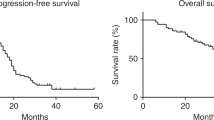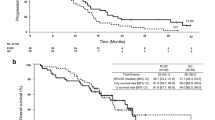Summary
Carboplatin (CBDCA) is a second-generation cisplatin analog that has shown activity in early clinical trials. Its spectrum of toxicity is quantitatively and qualitatively different from that of the parent compound. Between November 1984 and September 1986 we conducted a phase II trial of CBDCA in 46 women with epithelial ovarian cancer. All patients had undergone at least one prior chemotherapy regimen; 41 (89%) had previously received cisplatin (mean cumulative dose, 540 mg/m2). The CBDCA dose was based on renal function and was injected i. v. once every 4 weeks. Patients were stratified on the basis of baseline creatinine clearance: those with a baseline creatinine clearance of ≥60 ml/min received 400 mg/m2 CBDCA; those with a creatinine clearance between 30 and 60 ml/min received an initial dose calculated according to a previously published formula [2, 3] that corrected for renal insufficiency and projected nadir platelet counts of 75,000/mm3. Of 41 evaluable patients, 6 (15%) had an objective response [2 complete responses (CRs); 4 partial responses (PRs)]; 5 of the 6 responders had previously responded to cisplatin treatment. No responses were observed in 12 patients who had not responded to prior cisplatin therapy. Significant hematologic toxicity was seen. Of 18 patients with a creatinine clearance of ≥60 ml/min (dose, 400 mg/m2), 6 had nadir platelet counts of <25,000/mm3, 4 with symptomatic bleeding. Of the 21 evaluable patients for whom the dose-modification formula was applied, 10 had nadir platelet counts of <75,000/mm3; 5 had counts of <50,000/mm3. CBDCA has activity even in patients who have previously undergone extensive cisplatin therapy; however, its toxicity is variable and thrombocytopenia is dose-limiting. We did not confirm the ability of the above-mentioned formula to calculate the CBDCA dose and accurately predict the nadir platelet count for all patients. Other factors, such as prior radiotherapy, may also be important in the dosing of CBDCA in pretreated patients.
Similar content being viewed by others
References
Calvert AH, Harland SJ, Newell DR, Siddik ZH, Jones AC, McElwain TJ, Raju S, Wiltshaw E, Smith IE, Baker JM, Peckman MJ, Harrap KR (1982) Early clinical studies with cis-diammine 1,1-cyclobutane dicarboxylate platinum II. Cancer Chemother Pharmacol 9: 140–147
Egorin MJ, Van Echo DA, Tipping SJ, Olman EA, Whitacre MY, Thompson BW, Aisner J (1984) Pharmacokinetics and dosage reduction of cis-diammine(1,1-cyclobutanedicarboxylato)platinum in patients with impaired renal function. Cancer Res 44: 5432–5436
Egorin MJ, Van Echo DA, Olman EA, Whitacre MX, Forrest A, Asner J (1985) Prospective validation of a pharmacologically based dosing scheme for the cis-diamminedichloroplatinum(II) analogue diaminecyclobutane-dicarboxylatoplatinum. Cancer Res 45: 6502–6506
Eisenhauer EA, Swenerton KD, Sturgeon JFG, Fine S, O'Reilly SE (1986) Phase II study of carboplatin in patients with ovarian carcinoma: a National Cancer Institute of Canada Clinical Trials Study Group study. Cancer Treat Rep 70: 1195–1198
Evans BD, Raju KS, Calvert AH, Harland SJ, Wiltshaw E (1983) Phase II study of JM8, a new platinum analog, in advanced ovarian carcinoma. Cancer Treat Rep 67: 997–1000
Gaver RC, Colombo N, Green MD, George AM, Deeb G, Morris AD, Canetta RM, Speyer JL, Farmen RH, Muggia FM (1987) The disposition of carboplatin in ovarian cancer patients. Am Assoc Cancer Res 28: 195 (abstract 776)
Leyvraz S, Ohnuma T, Lassus M, Holland JF (1985) Phase I study of carboplatin in patients with advanced cancer, intermittent intravenous bolus, and 24-hour infusion. J Clin Oncol 3: 1385–1392
Priego V, Luc V, Bonnem E, Rahmen A, Smith F, Schein P, Wolley P (1983) A phase I study and pharmacology of diammine (1,1) cyclobutane dicarboxylate (2-1-0) platinum (CBDCA) administered on a weekly schedule. Proc Am Soc Clin Oncol 24: 30
Rozencweig M, Nicaise C, Beer M, Crespeigne N, Van Rijmenant M, Lenaz L, Kenis Y (1983) Phase I study of carboplatin given on a 5-day intravenous schedule. J Clin Oncol 1: 621–626
Wiltshaw E, Evans B, Harland S (1985) Phase III randomised trial cisplatin versus JM8 (carboplatin) in 112 ovarian cancer patients, stages III and IV. Proc Am Soc Clin Oncol 4: 121
Author information
Authors and Affiliations
Additional information
Supported in part by a grant from Bristol Myers Company Pharmaceutical Research and Development Division, CRU CA 16087 and CRU-96.
N. Colombo is the recipient of a fellowship from the American Italian Foundation for Cancer Research.
Rights and permissions
About this article
Cite this article
Colombo, N., Speyer, J.L., Green, M. et al. Phase II study of carboplatin in recurrent ovarian cancer: severe hematologic toxicity in previously treated patients. Cancer Chemother. Pharmacol. 23, 323–328 (1989). https://doi.org/10.1007/BF00292413
Received:
Accepted:
Issue Date:
DOI: https://doi.org/10.1007/BF00292413




